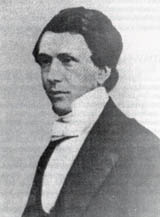Classic DACB Collection
All articles created or submitted in the first twenty years of the project, from 1995 to 2015.Murray (Jr.), Andrew (A)

Andrew Murray Jr. (Graaff-Reinet May 9, 1828- January 18, 1917), minister of the Nederduitse Gereformeerde Kerk (NGK), theologian, writer and educator, was the second of 16 children of Andrew Murray, Sr. who came to South Africa from Scotland in 1822 and served Graaff- Reinet as NGK minister until his death in 1866.
After obtaining his M.A. in Scotland, Murray studied theology in the Netherlands and was ordained as a minister there in 1848. On returning to South Africa, he was sent to Bloemfontein, becoming the first regular minister north of the Orange River. He did much to repair the strained relations that existed between the Voortrekkers and the Cape Church. Murray played a decisive role in dissuading the Voortrekker leader Andries Pretorius from interfering in the affairs of the Orange River Sovereignty. He acted as an interpreter at the Sand River Convention of 1852, which recognized the independence of the Boers north of the Vaal. Murray was opposed to the British withdrawal from the Orange River Sovereignty, but a journey to London failed to persuade the government to reverse its decision.
In 1856 Murray married Emma Rutherfoord, daughter of a Cape Town businessman. They were to spend the next 48 years together and had 11 children. In 1860 he became minister at Worcester; between 1864 and 1871 he served in Cape Town and then moved to Wellington where he worked until his retirement in 1906. He was elected Moderator of the NGK synod in 1862, 1876, 1883, 1890 and 1894. In the 1860s he led the Church in its struggle against theological liberalism, defending the Church in the civil courts of the colony and before the Privy Council in England.
Murray was a revivalist preacher and undertook numerous evangelical campaigns. While abroad attending conferences, he also recruited teachers in the Netherlands and the U.S.A. He made a significant contribution to education in South Africa. He was the moving spirit behind the establishment of Grey College in Bloemfontein in 1856 and also its first rector. In Wellington in 1877 he founded an institution for the training of missionaries, and he was instrumental in founding the Huguenot Seminary in Wellington in 1874, based on the Ladies Seminary at Mount Holyoke in Massachusetts. The Wellington Seminary became the model for other seminaries which were founded in the next few years.
Murray’s great faith in the efficacy of prayer, his belief in the importance of mission work, his striving towards church unity, his interest in faith healing, and his mystical piety are reflected in his literary legacy of some 250 publications, some of which have been translated into numerous languages. Murray received honorary doctorates from the Universities of Aberdeen in 1898 and the Cape of Good Hope in 1907. There is a statue of Murray next to the Groote Kerk in the heart of Cape Town.
K.W. Smith
Bibliography
J. du Plessis, The Life of Andrew Murray of South Africa, London, 1919.
W.M. Douglas. Andrew Murray and His Message: One of God’s Choice Saints, London, 1926.
Andrew Murray, Versamelde Werke, 10 volumes. Stellenbosch, 1942-45.
B. Conradie, Andrew Murray na Honderd Jaar, Stellenbosch, 1951.
Joyce Murray, Young Mrs. Murray Goes to Bloemfontein, Cape Town, 1954.
Dictionary of South African Biography, Vol. 1. Standard Encyclopaedia of Southern Africa, Vol. 7.
This article was reprinted from The Encyclopaedia Africana Dictionary of African Biography (In 20 Volumes). Volume Three: South Africa- Botswana-Lesotho-eswatini. Ed. Keith Irvine. Algonac, Michigan: Reference Publications Inc., 1995. All rights reserved.



